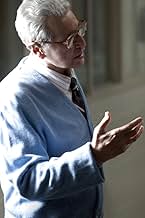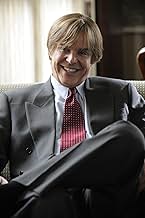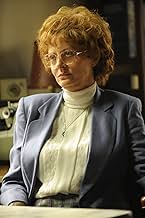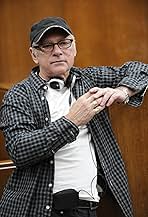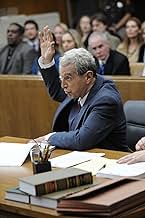AVALIAÇÃO DA IMDb
7,5/10
31 mil
SUA AVALIAÇÃO
Um olhar sobre a vida e obra do defensor da eutanásia Jack Kevorkian.Um olhar sobre a vida e obra do defensor da eutanásia Jack Kevorkian.Um olhar sobre a vida e obra do defensor da eutanásia Jack Kevorkian.
- Direção
- Roteirista
- Artistas
- Ganhou 2 Primetime Emmys
- 11 vitórias e 38 indicações no total
Avaliações em destaque
10D_Burke
If you remember the 90's, Dr. Jack Kevorkian needs no introduction. His name was as much the subject of medical controversy as it was the punchline of countless jokes. His name was as notorious to some as O.J. Simpson or Richard Ramirez, yet also as admirable to others as Bill Clinton or Michael Jordan.
In the hands of many other directors, Kevorkian's biopic could have been treated more like a farce based on the doctor's past eccentricities, such as showing up in court wearing a powdered wig. Of course, Kevorkian's unabashed behaviors in front of camera lenses are depicted in this film, but fortunately, the details of his assisted suicides are not ever given any sugar coated treatments.
"You Don't Know Jack" tells the story about Dr. Kevorkian we should already know. Taking place from approximately 1990-1999, the film takes us from Kevorkian's days of being an unemployed physician to the trial that brought an end to his morally questionable practice for good. The lighting throughout this film is dark and often times dreary, but never dull thanks foremost to an impressive performance by Al Pacino that may be his best since "Scent of a Woman".
When watching this film, there was rarely a moment where I thought to myself, "That's Al Pacino playing Dr. Kevorkian". Pacino's signature eyes and husky voice are still ever present, but he disappears into his role so effectively that I found myself saying, "That is Dr. Kevorkian". Not only is that feat so hard to accomplish for an actor so iconic as Pacino, but it's also hard to play someone who most of the American public knew so well from being on TV all the time.
While it's impressive for Pacino to play the Jack we do know, he plays the Jack many "don't know" with a wry wit that makes an appealing character, even if you don't agree with assisted suicide. A great scene involved Pacino delving a subtle verbal blow to protesters outside his apartment building. When he says that the God he believes in, namely Johann Sebastian Bach, isn't imaginary like the God the protesters believe in, you can't help but laugh. I'm Catholic, and I thought it was hilarious.
However, this movie's strength comes in its nonjudgmental view on Kevorkian's practices. The movie never tells you how you should feel, but also clears up the notion that Kevorkian practiced his assisted suicides with reckless abandon. Many of the suicides in the movie focus on the patients themselves, and their absolute certainty that they want their suffering to end. Of course, leaving their loved ones is their hardest decision, something the film indeed recognizes. Is it still wrong? This movie doesn't tell, nor should it.
What's interesting, though, is the focus on Pacino's eyes during the scene where he performs his first procedure. They move back and forth on the screen as the operation continues, and don't try to mask any emotion of any kind. It could mean that Kevorkian doesn't care about his patients, or that he cares enough about them to keep the procedure as precise as possible. The main point: You decide.
The same is true for Kevorkian's unabashed character on camera. It's all here in this film, but director Barry Levinson resists the temptation for Pacino as Kevorkian to wink and nod at the camera. Considering Levinson directed excellent character-centric comedy/dramas like "Good Morning Vietnam" and "Man of the Year", the temptation must have been there. Fortunately, he used his knack for dramas like "Rainman" and "Avalon" instead, and the effect worked wonders.
The supporting cast behind Pacino is excellent. Danny Huston is fantastic as Geoffrey Fieger, Kevorkian's successful lawyer, and is equally as good interacting with Pacino as he is in the courtroom scenes. Brenda Vaccaro, Susan Sarandon, and John Goodman are great supporting members of this film as colleagues who believe in Kevorkian's mission, but also have the outside vantage point to know what he's inevitably destined for.
Whether you agree with Kevorkian's practices or not, it is impossible not to be compelled by this movie. The story draws you in, the characters are well developed in all the right areas, and it doesn't take more than five minutes for Pacino to convince you he is Dr. Jack Kevorkian. Do you know Jack by the end of this film? I'm still not sure. But I know an excellent movie when I see one, and this deserves 10 stars. See it!
In the hands of many other directors, Kevorkian's biopic could have been treated more like a farce based on the doctor's past eccentricities, such as showing up in court wearing a powdered wig. Of course, Kevorkian's unabashed behaviors in front of camera lenses are depicted in this film, but fortunately, the details of his assisted suicides are not ever given any sugar coated treatments.
"You Don't Know Jack" tells the story about Dr. Kevorkian we should already know. Taking place from approximately 1990-1999, the film takes us from Kevorkian's days of being an unemployed physician to the trial that brought an end to his morally questionable practice for good. The lighting throughout this film is dark and often times dreary, but never dull thanks foremost to an impressive performance by Al Pacino that may be his best since "Scent of a Woman".
When watching this film, there was rarely a moment where I thought to myself, "That's Al Pacino playing Dr. Kevorkian". Pacino's signature eyes and husky voice are still ever present, but he disappears into his role so effectively that I found myself saying, "That is Dr. Kevorkian". Not only is that feat so hard to accomplish for an actor so iconic as Pacino, but it's also hard to play someone who most of the American public knew so well from being on TV all the time.
While it's impressive for Pacino to play the Jack we do know, he plays the Jack many "don't know" with a wry wit that makes an appealing character, even if you don't agree with assisted suicide. A great scene involved Pacino delving a subtle verbal blow to protesters outside his apartment building. When he says that the God he believes in, namely Johann Sebastian Bach, isn't imaginary like the God the protesters believe in, you can't help but laugh. I'm Catholic, and I thought it was hilarious.
However, this movie's strength comes in its nonjudgmental view on Kevorkian's practices. The movie never tells you how you should feel, but also clears up the notion that Kevorkian practiced his assisted suicides with reckless abandon. Many of the suicides in the movie focus on the patients themselves, and their absolute certainty that they want their suffering to end. Of course, leaving their loved ones is their hardest decision, something the film indeed recognizes. Is it still wrong? This movie doesn't tell, nor should it.
What's interesting, though, is the focus on Pacino's eyes during the scene where he performs his first procedure. They move back and forth on the screen as the operation continues, and don't try to mask any emotion of any kind. It could mean that Kevorkian doesn't care about his patients, or that he cares enough about them to keep the procedure as precise as possible. The main point: You decide.
The same is true for Kevorkian's unabashed character on camera. It's all here in this film, but director Barry Levinson resists the temptation for Pacino as Kevorkian to wink and nod at the camera. Considering Levinson directed excellent character-centric comedy/dramas like "Good Morning Vietnam" and "Man of the Year", the temptation must have been there. Fortunately, he used his knack for dramas like "Rainman" and "Avalon" instead, and the effect worked wonders.
The supporting cast behind Pacino is excellent. Danny Huston is fantastic as Geoffrey Fieger, Kevorkian's successful lawyer, and is equally as good interacting with Pacino as he is in the courtroom scenes. Brenda Vaccaro, Susan Sarandon, and John Goodman are great supporting members of this film as colleagues who believe in Kevorkian's mission, but also have the outside vantage point to know what he's inevitably destined for.
Whether you agree with Kevorkian's practices or not, it is impossible not to be compelled by this movie. The story draws you in, the characters are well developed in all the right areas, and it doesn't take more than five minutes for Pacino to convince you he is Dr. Jack Kevorkian. Do you know Jack by the end of this film? I'm still not sure. But I know an excellent movie when I see one, and this deserves 10 stars. See it!
What a different role for Pacino! But, he was just as great and totally brilliant and believable in this quiet but driven, eccentric role as he usually is in his other roles where he furiously eats the scenery throughout.
I wasn't sure if his "Midwestern" accent was a Fargo caricature or if he was merely channeling Chief Dan George in Little Big Man, but it sure was interesting to hear an NYC Italian able to be so believable in his upper midwest accent that was located about 10 miles east of Minneapolis, or close thereabouts. Meryl Streep, move over.
The philosophy of this controversial subject is much more serious. America is so far behind the rest of the world in assisted suicide, as many countries now allow a person to die an assisted death for any reason, with no incurable illness or the like required. All it requires is a waiting period to be positive of the hard decision made. And here we are in the good old retarded USofA, still not allowing the dignified assisted death of terribly suffering and/or terminal souls who merely and quietly want nothing more disruptive than a personal, peaceful, and painless end to their agonizing day-to-day existence. (I totally agree with the rest of the world that it is as much or more an individual decision as is having an abortion and no political or religious entity should have any say in what a person makes up his mind to do in this matter. These intruding entities should not play any part at all in influencing and determining the right and wrong of it, as there is none to a rational thinker.)
All supporting roles were well done, with John Goodman bringing much needed comic relief at times to this achingly serious story. Brenda Vaccaro as the doc's conflicted sister and fellow death-with-dignity proponent Susan Sarandon were truly positive additions to the cast. Direction by the brilliant Barry Levinson was nonpariel and as good as his earlier Rain Man.
I truly hope this film moves the assisted death argument forward in America as it couldn't go any further backward, and more is the pity for that unevolved thinking.
I wasn't sure if his "Midwestern" accent was a Fargo caricature or if he was merely channeling Chief Dan George in Little Big Man, but it sure was interesting to hear an NYC Italian able to be so believable in his upper midwest accent that was located about 10 miles east of Minneapolis, or close thereabouts. Meryl Streep, move over.
The philosophy of this controversial subject is much more serious. America is so far behind the rest of the world in assisted suicide, as many countries now allow a person to die an assisted death for any reason, with no incurable illness or the like required. All it requires is a waiting period to be positive of the hard decision made. And here we are in the good old retarded USofA, still not allowing the dignified assisted death of terribly suffering and/or terminal souls who merely and quietly want nothing more disruptive than a personal, peaceful, and painless end to their agonizing day-to-day existence. (I totally agree with the rest of the world that it is as much or more an individual decision as is having an abortion and no political or religious entity should have any say in what a person makes up his mind to do in this matter. These intruding entities should not play any part at all in influencing and determining the right and wrong of it, as there is none to a rational thinker.)
All supporting roles were well done, with John Goodman bringing much needed comic relief at times to this achingly serious story. Brenda Vaccaro as the doc's conflicted sister and fellow death-with-dignity proponent Susan Sarandon were truly positive additions to the cast. Direction by the brilliant Barry Levinson was nonpariel and as good as his earlier Rain Man.
I truly hope this film moves the assisted death argument forward in America as it couldn't go any further backward, and more is the pity for that unevolved thinking.
You Don't Know Jack is a long movie but it never feels long, in fact it could have been longer for me, as for that the biographical story is too important and debatable (or not). Logically it's a farce that it's debatable because everybody should be able to make the decision to end his own life or not, and certainly when you are incurably sick and in a lot of pain. Nobody deserves neverending pain, nobody deserves to live like a plant if they don't wish to. What Jack Kevorkian did should be normal, without even questioning, like it's done in many other countries where you can die with dignity. Again religion and absurd laws dictate the American juridical system, a system with laws that are antiquated and that make no sense at all anymore. So yes the movie is an important and interesting story. It's well made with a great cast that all contributed to make this movie more than enjoyable. Al Pacino is excellent in this movie, in a role that we're not used to see him, but where he proves he's a great actor that can play different characters. I thought it was one of his best performances. You Don't Know Jack is about the courageous doctor Jack Kevorkian, a man that didn't deserve to be put behind bars, not even one day. Very good emotional movie, not easy to watch for everybody, certainly not if you saw somebody close rot in pain until his last breath. In conclusion I wish everybody that is against euthanasia to die in a long terrible and painful way, see if you like it then.
Confession: I have long been a fan of Jack Kevorkian, and believed in his cause. Yes, he does walk a thin line at times, and raises some ethical issues, but his general point always seemed sound to me.
Here is the first film on his life (at least the part that we care about) that merits watching. It tells the whole story, does it very effectively, and gives us one of the best Al Pacino roles in years. Also, we learn more about his friend Neil and his attorney, both of whom were always played down in the news.
Although the film runs a bit on the long side, and could possibly be trimmed by ten minutes, I really enjoyed it. Pacino should be proud, and Kevorkian himself could ask of no greater portrayal of his work.
Here is the first film on his life (at least the part that we care about) that merits watching. It tells the whole story, does it very effectively, and gives us one of the best Al Pacino roles in years. Also, we learn more about his friend Neil and his attorney, both of whom were always played down in the news.
Although the film runs a bit on the long side, and could possibly be trimmed by ten minutes, I really enjoyed it. Pacino should be proud, and Kevorkian himself could ask of no greater portrayal of his work.
Throughout the history of Mankind, there are a plethora of unique individuals who stand as giants as they have changed the world. Columbus, Gailieo, Copernicus, Darwin and Einstein, have all fought a prevailing notion of a given era. To this famous list one can add the dedicated Dr. Jack Kavorkian. Born May 26, 1928 is an American pathologist, right-to-die activist and painter. His life is the center of this movie called " You don't know Jack. " Al Pacino, who bears an astonish resemblance, plays Dr. Jack Kevorkian and does an incredible job. Other notable thespians like Brenda Vaccaro, Susan Sarandon, John Goodman and Danny Huston all appear like towering pillars in a magnificent temple. Together their performance allows the audience to view the good doctor in his Herculeion task of establishing a man's right to die. Despite being ostracized, ridiculed, vilified, hounded and even imprisoned, Kavorkian continued and in the minds of millions of rational people, his struggle established the precedent for humans, not a puritanical government, to chose the time to die. Pacino's performance is exceptional and this movie will become a Classic for future audiences. Recommended to anyone willing to listen. ****
Você sabia?
- CuriosidadesBased on Neal Nicol's and Harry Wylie's novel, "Between the Dying and the Dead: Dr. Jack Kevorkian, the Assisted Suicide Machine and the Battle to Legalize Euthanasia." It was published by Vision in 2006.
- Erros de gravaçãoDr. Kevorkian's original death machine (using IV drugs) was called the Thanatron, not Mercitron. The Mercitron was the name of his carbon monoxide based death machine.
- Citações
Lynn Mills: Have you no religion? Have you no God?
Jack Kevorkian: Oh, I do, lady, I have a religion, his name is Bach. Johann Sebastian Bach. And at least my God isn't an invented one.
- Trilhas sonorasEarly in the Morning
Written by Dallas Bartley, Leo Hickman & Louis Jordan
Performed by Harry Nilsson
Courtesy of RCA Records
By Arrangement with Sony Music Entertainment
Principais escolhas
Faça login para avaliar e ver a lista de recomendações personalizadas
Detalhes
- Data de lançamento
- País de origem
- Central de atendimento oficial
- Idioma
- Também conhecido como
- You Don't Know Jack
- Locações de filme
- Empresas de produção
- Consulte mais créditos da empresa na IMDbPro
Bilheteria
- Orçamento
- US$ 18.000.000 (estimativa)
- Tempo de duração
- 2 h 14 min(134 min)
- Cor
- Mixagem de som
- Proporção
- 1.78 : 1
- 1.85 : 1
Contribua para esta página
Sugerir uma alteração ou adicionar conteúdo ausente


